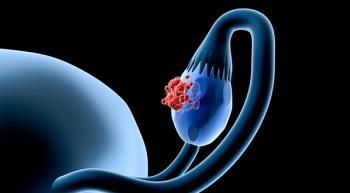
First-Line Disitamab Vedotin Combo Ups Survival in Urothelial Cancer
Disitamab vedotin plus toripalimab improved PFS and OS over chemo in HER2+ metastatic urothelial cancer, per phase 3 RC48-C016 interim analysis.
Patients with HER2-expressing, locally advanced or metastatic urothelial carcinoma experienced statistically significant and clinically meaningful improvements in progression-free survival (PFS) and overall survival (OS) vs chemotherapy when treated with disitamab vedotin (Aidixi) plus toripalimab (Loqtorzi), according to a prespecified interim analysis from the phase 3 RC48-C016 trial (NCT05302284) evaluated by an independent data monitoring committee.1
The interim analysis showed that the combination therapy significantly improved both primary end points of PFS and OS across key subgroups, including patients irrespective of HER2 expression levels and cisplatin eligibility status. The treatment regimen was also associated with a manageable safety profile and tolerable adverse effects.
Based on the positive efficacy and safety data observed in this interim analysis, investigators announced plans to submit a Biologic License Application (BLA) to the Center for Drug Evaluation of the National Medical Products Administration (NMPA) in China. The completed results from the phase 3 trial are expected to be presented at an upcoming international oncology conference.
"[These results are] extremely exciting. We, once again, jointly witnessed a strong positive result of disitamab vedotin combined with toripalimab in the first-line treatment of advanced urothelial carcinoma. Regardless of whether the patients are suitable for cisplatin treatment and regardless of patients' HER2 expression status, disitamab vedotin combined with toripalimab significantly improved PFS and OS," Guo Jun, MD, PhD, a professor at Peking University Cancer Hospital and principal study investigator, stated in a news release. "This outstanding efficacy proves the success of the 'HER2-[directed] ADC plus immunotherapy' combination treatment concept and is also a major breakthrough in the global treatment of urothelial carcinoma.”
Disitamab vedotin is a HER2-directed antibody-drug conjugate that was previously approved by the NMPA for the treatment of patients with HER2-overexpressing locally advanced or metastatic urothelial carcinoma who were previously treated with platinum-based chemotherapy.
In September 2020, the FDA granted breakthrough therapy designation to disitamab vedotin for the second-line treatment of patients with HER2-positive, locally advanced or metastatic urothelial cancer who have also previously received platinum-containing chemotherapy treatment.2
RC48-C016 Trial Design and Background
RC48-C016 is a randomized, active-controlled, multicenter trial designed to evaluate the efficacy and safety of disitamab vedotin in combination with toripalimab compared with standard chemotherapy in patients at least 18 years of age with HER2-expressing locally advanced or metastatic urothelial carcinoma who have not received prior systemic treatment for advanced disease.3
Eligible patients were required to have HER2-expressing tumors, defined by immunohistochemistry scores of 1+, 2+, or 3+. Other key inclusion criteria comprised a life expectancy of at least 12 weeks, at least 1 measurable lesion per RECIST 1.1 criteria, an ECOG performance status of 0 or 1, and adequate cardiac, bone marrow, hepatic, renal, and coagulation function. Prior treatment with any ADC or immune checkpoint inhibitor was not allowed, and those with active central nervous system metastases were excluded.
Patients were randomly assigned to receive disitamab vedotin at 2.0 mg/kg once every 2 weeks in combination with toripalimab at 3.0 mg/kg every 2 weeks; or standard gemcitabine in combination with cisplatin or carboplatin.
Along with the dual primary end points of PFS and OS, secondary end points include safety, overall response rate, duration of response, and disease control rate.
“We look forward to the excellent performance of disitamab vedotin in subsequent studies, which should provide better decision-making basis for clinicians, bring more benefits to patients, and reshape the global treatment landscape of urothelial carcinoma with the 'Chinese approach," Jun concluded.1
References
- Poised to reshape treatment landscape: the phase 3 clinical trial of disitamab vedotin as a first-line therapy for HER2-expressing locally advanced or metastatic urothelial carcinoma reached its primary endpoints of PFS and OS. News Release. RemeGen. May, 12, 2025. Accessed May 12, 2025. https://www.prnewswire.com/news-releases/poised-to-reshape-treatment-landscape-the-phase-3-clinical-trial-of-disitamab-vedotin-as-a-first-line-therapy-for-her2-expressing-locally-advanced-or-metastatic-urothelial-carcinoma-reached-its-primary-endpoints-of-pfs-and-os-302452193.html
- RemeGen announces US FDA has granted breakthrough therapy designation for disitamab vedotin (RC48) in urothelial cancer. News release. RemeGen. September 25, 2020. Accessed May 12, 2025. https://www.prnewswire.com/news-releases/remegen-announces-us-fda-has-granted-breakthrough-therapy-designation-for-disitamab-vedotin-rc48-in-urothelial-cancer-301138315.html
- A study of RC48-ADC combined with toripalimab for first-line treatment of rrothelial carcinoma. ClinicalTrials.gov. Updated December 18, 2023. Accessed May 12, 2025. https://clinicaltrials.gov/study/NCT05302284
Newsletter
Knowledge is power. Don’t miss the most recent breakthroughs in cancer care.
























































































